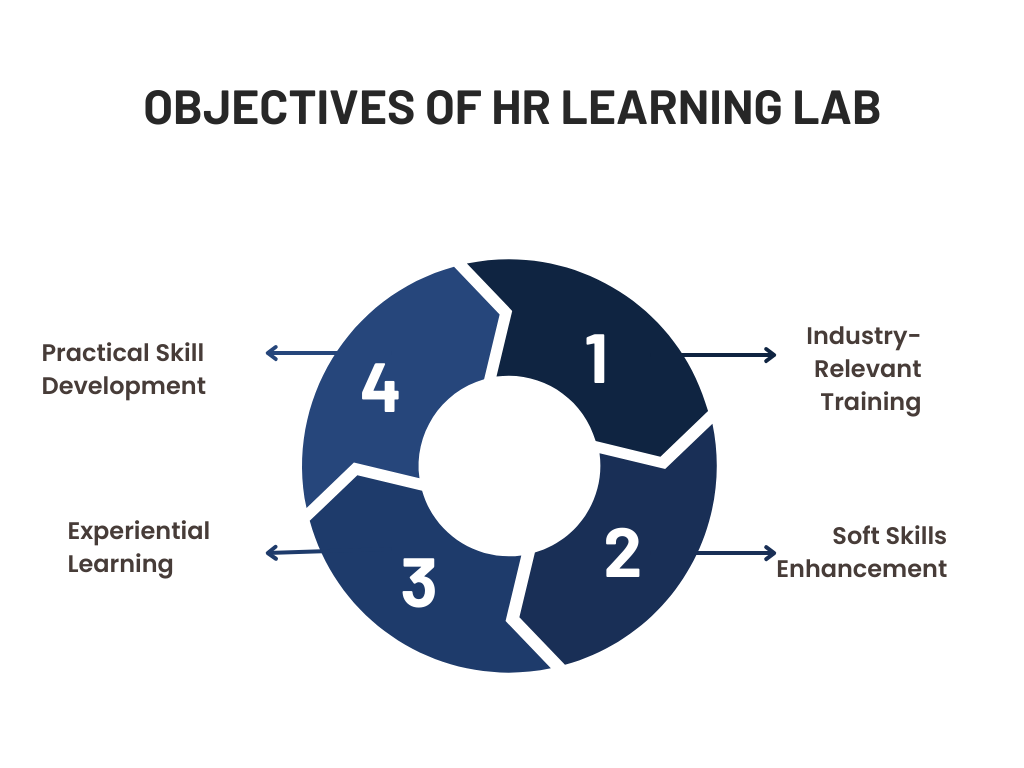Employers seek candidates who possess academic qualifications, practical skills, and real-world experience. This shift in hiring preferences has led to innovative educational initiatives like HR Learning Lab, aimed at bridging the gap between academic learning and industry requirements.
In this article, we delve into the concept of HR Learning Lab, exploring its objectives, methodologies, benefits, and role in preparing students to excel in their careers.
Introduction to HR Learning Lab
HR Learning Lab is a pioneering initiative designed to provide students with hands-on experience and practical human resources (HR) knowledge. It serves as a platform where theoretical concepts are translated into real-world applications, preparing students to navigate the complexities of the modern workplace effectively.
Also Read: HR Interview Questions
Objectives of HR Learning Lab
Practical Skill Development:
The primary objective of the HR Learning Lab is to equip students with practical skills essential for success in the HR domain. Participants gain insights into various HR functions through interactive workshops, case studies, and simulations, including recruitment, performance management, employee relations, and HR analytics.
Industry-Relevant Training:
HR Learning Lab ensures its curriculum remains aligned with industry trends and practices. By incorporating input from seasoned HR professionals and industry experts, the program delivers relevant and up-to-date training, enhancing students' employability upon graduation.

Experiential Learning:
Recognizing the value of experiential learning, HR Learning Lab provides students with opportunities to apply theoretical concepts in real-world scenarios. Practical exercises, role-plays, and internship placements enable participants to develop critical thinking skills and problem-solving abilities essential for HR professionals.
Soft Skills Enhancement:
In addition to technical competencies, HR Learning Lab emphasizes developing soft skills such as communication, teamwork, leadership, and emotional intelligence. These skills are vital for building productive work relationships, fostering collaboration, and driving organizational success.
|
Methodologies Employed
Interactive Workshops: HR Learning Lab conducts interactive workshops where students engage in discussions, case analyses, and group activities. These sessions facilitate active learning and promote peer-to-peer knowledge exchange.
Case Studies and Simulations:
Real-life case studies and simulations are integral to the HR Learning Lab curriculum. Participants are tasked with solving HR challenges, making strategic decisions, and handling complex scenarios, honing their decision-making and problem-solving skills.
Guest Lectures and Industry Immersion:
To provide students with insights into industry practices, HR Learning Lab invites guest speakers from leading organizations to share their experiences and expertise. Furthermore, students may have the opportunity to undertake industry immersion programs, gaining firsthand exposure to the workings of HR departments in various sectors.
Internship Placements:
HR Learning Lab facilitates internship placements for its participants, allowing them to gain practical experience in natural work settings. Internships enable students to apply theoretical knowledge, acquire new skills, and build professional networks, enhancing their employability and career prospects.
HR Analytics Course
Benefits of HR Learning Lab
Enhanced Employability:
Graduates of HR Learning Lab are equipped with a diverse skill set and practical experience, making them highly sought-after by employers. The program's emphasis on industry relevance and experiential learning ensures that students are well-prepared to meet the job market demands.
Career Advancement Opportunities:
Participants of HR Learning Lab gain a competitive edge in their careers, with many securing job offers or advancing to higher positions upon completion of the program. The combination of technical expertise, soft skills, and practical experience positions them for long-term success in HR.
Networking and Professional Development:
HR Learning Lab provides students ample opportunities to network with industry professionals, mentors, and fellow participants. These connections can be invaluable for career growth, mentorship, and job opportunities within the HR community.
Personal Growth and Confidence Building:
Engaging in experiential learning activities and tackling real-world challenges fosters personal growth and confidence among participants. Through overcoming obstacles, receiving feedback, and refining their skills, students develop a sense of self-assurance and readiness to take on professional responsibilities.
Critical Components of a Workplace Learning Lab
As you refine and shape your workplace learning lab, it's essential to ensure it encompasses certain key elements:
Online Spaces and E-Learning:
Your learning lab must feature virtual environments where learners can access educational resources and interact with peers, instructors, and industry professionals. It's crucial to provide supplemental e-learning materials to accommodate remote work arrangements and use personal devices for work purposes.
Diverse Learning Resources:
A comprehensive learning lab should offer many resources, including online libraries, physical books, and curated content from reputable sources. Learners should have easy access to diverse learning materials in various formats to support their educational journey effectively.
Social Learning Opportunities:
Encourage social interaction among employees by providing online forums and facilitating in-person study groups. This fosters a collaborative learning environment where individuals can exchange ideas, ask questions, and support each other as they develop their skills.
Blend of Online and In-Person Training:
Optimal learning labs provide a balanced mix of online and in-person learning options. Learners should be flexible to engage with tutors, participate in hands-on activities, and attend live workshops and seminars according to their needs and preferences. This hybrid approach ensures a well-rounded learning experience that caters to diverse learning styles and preferences.
